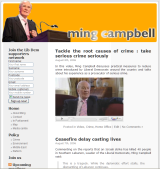Determined that the Liberal Democrats will remain the party of the environment in Opposition and in Government
Ming Campbell made the following speech at the Eden Project on January 23, 2005.
I am delighted to be here at the Eden project – which teaches us, challenges us and inspires us about our own planet.
I am pleased to be joined today by some colleagues especially Norman Baker, our Environment spokesman, who has been a fearsome critic of government and politicians who talk but do not act. I am proud that Norman is supporting me in my leadership campaign.
If the old politics was about tax and spend; the new politics is about the interdependence of our world. The quality of life for us and our children and grandchildren depend on how we face up now to the critical environmental issues. Our prosperity, our security, our quality of life, the very sustainability of the planet, depends on it.
In 2003 the UN reported that 60 per cent of the ecosystems that support life on Earth are being degraded or used unsustainably. And more recently James Lovelock warned that global climate change may have reached a point of no return.
So the challenge, then, is not to make the rhetorical case for taking the degradation of our environment seriously. We must transform that case into practical political measures which make a real difference to the sustainability of our shared environment. So urgently we need to develop policies which change individual behaviour and show how environmentally responsible actions increase, rather than decrease, the quality of life for all. When the Clean Air Act was introduced it was held to be an act of economic vandalism, killing off smokestack industries and throwing thousands of people out of work. Yet soon the absence of the choking smog was held to be one of the greatest advances in the quality of life in the capital ever introduced.
Equally, today we must be far more imaginative in explaining how a change in individual behaviour can produce a win-win outcome for both the environment and citizens. This is at the heart of improving quality of life for all. Energy efficiency measures, for instance, which could do so much to cut carbon emissions, also provide financial savings for every family. As leader, I will be unveiling an action plan for a significant boost to energy saving technologies and incentives provided to households to make the necessary changes in their homes. That’s a win-win outcome.
What is true for households, also applies to businesses. The Carbon Trust recently set out the way in which the costs of energy efficiency measures implemented by manufacturers can be recouped through lower running costs. That’s a win-win outcome.
The tax system and user charges must be used to create the necessary incentives to change behaviour. Environmental concerns must be centred in the Treasury, not regarded as some sort of departmental add-on.
As leader, I will argue for an Environmental Incentive Programme in the Treasury to see how within the same overall tax envelope, incentives for good environmental behaviour can be built in to the tax system.
I am pleased that Simon and Chris and I are all united in arguing that we need an historic shift in our tax system to make polluters pay and to take the poorest out of tax.
Individual behaviour is more likely to change in the right direction if there is a clear incentive to do so, as well as a positive effect on the environment. That’s a win-win outcome.
As leader, I want to encourage councils to pioneer road charging systems, as long as councils have the right to use the revenues raised to improve their own public transport alternatives. This is how we can direct markets so that they give real economic incentives to environmental goods. That’s a win-win outcome.
As leader, I will be calling for new ideas to provide more information to individuals so that they can assess for themselves the environmental impact of their actions.
I believe, for instance, that airline tickets should provide information on the carbon emissions of each flight and a comparison with comparable train journeys where these exist.
In the long run, the development of individual or household carbon accounts, if the technology allows, could have a significant effect on everyday behaviour.
That’s a win-win outcome.
Underpinning all of this has to be a new international agreement on carbon dioxide emissions to tackle climate change.
Our party policy is based on the twin principles of contraction and convergence – we have to ensure that there is international agreement on contracting our carbon dioxide emissions and delivering an equitable convergence of emissions for all nations, developed and developing.
It is both unfair and unrealistic to expect India and China, for example, to cut their emissions if we do not reduce ours. But let us work together to persuade the United States to take climate change seriously – this should be one of the most pressing issues for British foreign policy.
So let us also work together to adopt the full range of renewable energy, to reduce energy demand, to embrace cleaned-up fossil fuel and to encourage localised micro generation rather than rushing towards the costly and problematic nuclear option.
Liberal Democrats are rightly proud of the pioneering role we have taken in environmental politics.
In this new political age, as leader, I will be determined that the Liberal Democrats will remain the party of the environment in Opposition and in Government.



